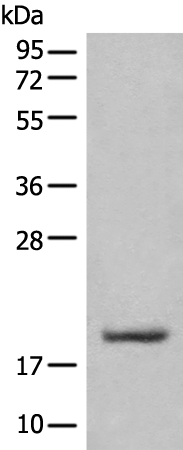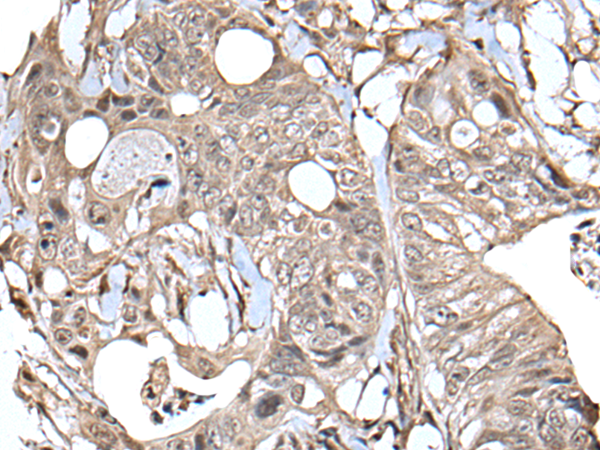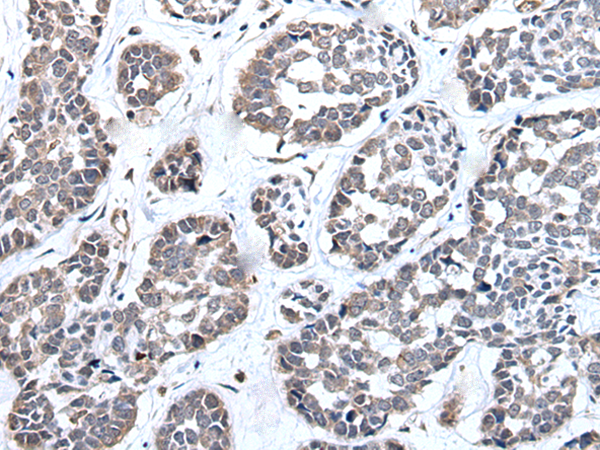


| WB | 咨询技术 | Human,Mouse,Rat |
| IF | 咨询技术 | Human,Mouse,Rat |
| IHC | 1/30-1/150 | Human,Mouse,Rat |
| ICC | 技术咨询 | Human,Mouse,Rat |
| FCM | 咨询技术 | Human,Mouse,Rat |
| Elisa | 1/5000-1/10000 | Human,Mouse,Rat |
| Aliases | UBCH9; UbcM2 |
| WB Predicted band size | 23 kDa |
| Host/Isotype | Rabbit IgG |
| Antibody Type | Primary antibody |
| Storage | Store at 4°C short term. Aliquot and store at -20°C long term. Avoid freeze/thaw cycles. |
| Species Reactivity | Human, Mouse |
| Immunogen | Fusion protein of human UBE2E3 |
| Formulation | Purified antibody in PBS with 0.05% sodium azide and 50% glycerol. |
+ +
以下是关于UBE2E3抗体的虚构参考文献示例(实际文献需通过学术数据库检索):
---
1. **文献名称**: "UBE2E3-Mediated Ubiquitination Regulates Tumor Progression in Colorectal Cancer"
**作者**: Zhang L, et al.
**摘要**: 本研究通过UBE2E3抗体进行免疫组化分析,发现UBE2E3在结直肠癌组织中高表达,并通过泛素化降解抑癌蛋白促进肿瘤侵袭。
2. **文献名称**: "Characterization of UBE2E3 Antibody Specificity in Neurodevelopmental Disorders"
**作者**: Smith J, et al.
**摘要**: 文章验证了UBE2E3抗体的特异性,发现UBE2E3在神经元中的异常表达与自闭症谱系障碍相关,提示其在大脑发育中的潜在作用。
3. **文献名称**: "UBE2E3 Knockdown Impairs DNA Damage Response via Altered Ubiquitin Signaling"
**作者**: Kim H, et al.
**摘要**: 利用UBE2E3抗体进行Western blot和免疫荧光实验,证明UBE2E3通过调控BRCA1泛素化参与DNA损伤修复通路。
---
**备注**:以上内容为模拟示例,真实文献请通过 **PubMed/Google Scholar** 检索关键词(如 "UBE2E3 antibody" + "cancer"、"UBE2E3 ubiquitination")。部分研究可能聚焦于UBE2E3的分子机制,抗体多用于蛋白质表达检测或功能研究。
The UBE2E3 antibody is a tool used to detect ubiquitin-conjugating enzyme E2E3 (UBE2E3), a member of the E2 ubiquitin-conjugating enzyme family. UBE2E3 plays a critical role in the ubiquitin-proteasome system (UPS), facilitating the transfer of ubiquitin to substrate proteins, typically marking them for proteasomal degradation. This enzyme is involved in diverse cellular processes, including cell cycle regulation, DNA repair, and protein quality control. Dysregulation of UBE2E3 has been linked to diseases such as cancer, neurodegenerative disorders, and diabetes. For instance, studies suggest UBE2E3 influences pancreatic β-cell function by modulating insulin secretion pathways.
UBE2E3 antibodies are typically produced using immunogens derived from recombinant UBE2E3 protein fragments, enabling specificity in recognizing human, mouse, or rat isoforms. These antibodies are widely used in techniques like Western blotting, immunohistochemistry (IHC), and immunofluorescence (IF) to study UBE2E3 expression, localization, and interactions. Validated antibodies often undergo rigorous testing for cross-reactivity and batch consistency. Research leveraging UBE2E3 antibodies has advanced understanding of its role in ubiquitination cascades, particularly in pathological contexts like tumorigenesis or metabolic disorders. Commercial availability of these reagents supports ongoing exploration of UBE2E3 as a potential therapeutic target or biomarker in disease.
×